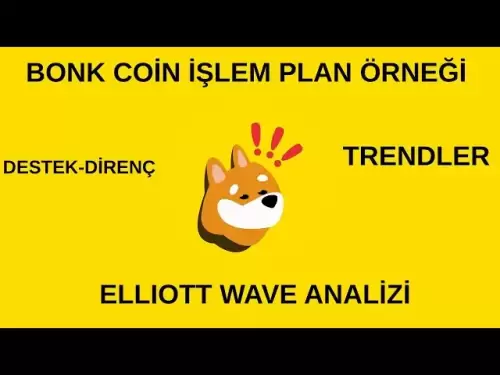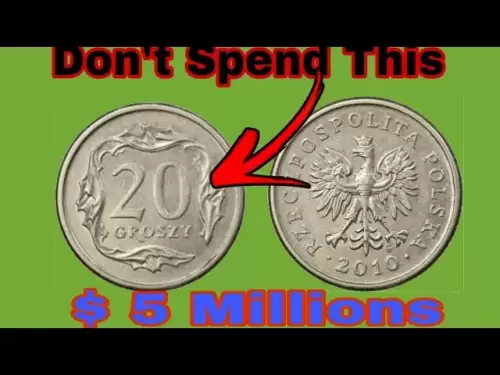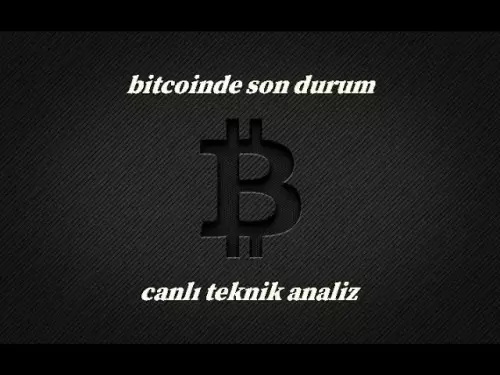-
 Bitcoin
Bitcoin $108,562.4295
0.46% -
 Ethereum
Ethereum $2,533.9553
1.52% -
 Tether USDt
Tether USDt $1.0002
-0.01% -
 XRP
XRP $2.2542
2.23% -
 BNB
BNB $662.4567
1.48% -
 Solana
Solana $151.4114
3.48% -
 USDC
USDC $0.9999
0.00% -
 TRON
TRON $0.2860
0.91% -
 Dogecoin
Dogecoin $0.1685
3.72% -
 Cardano
Cardano $0.5809
1.63% -
 Hyperliquid
Hyperliquid $39.2916
1.85% -
 Sui
Sui $2.8874
0.85% -
 Bitcoin Cash
Bitcoin Cash $496.5801
2.72% -
 Chainlink
Chainlink $13.3582
2.48% -
 UNUS SED LEO
UNUS SED LEO $9.0279
0.07% -
 Avalanche
Avalanche $18.0773
2.30% -
 Stellar
Stellar $0.2426
3.05% -
 Toncoin
Toncoin $2.9086
6.01% -
 Shiba Inu
Shiba Inu $0.0...01170
2.97% -
 Hedera
Hedera $0.1587
3.47% -
 Litecoin
Litecoin $87.4596
1.13% -
 Monero
Monero $317.0425
0.73% -
 Polkadot
Polkadot $3.3778
1.90% -
 Dai
Dai $0.9999
-0.01% -
 Ethena USDe
Ethena USDe $1.0001
-0.01% -
 Bitget Token
Bitget Token $4.4095
0.63% -
 Uniswap
Uniswap $7.3593
6.80% -
 Pepe
Pepe $0.0...09910
3.64% -
 Aave
Aave $274.7388
2.68% -
 Pi
Pi $0.4607
0.48%
is defi wallet safe
DeFi wallet security varies greatly; risks include smart contract flaws, phishing, and private key theft. Using reputable wallets, 2FA, and securely backing up your seed phrase are crucial for minimizing risk. Hardware wallets offer superior protection compared to software options.
Mar 21, 2025 at 08:22 pm
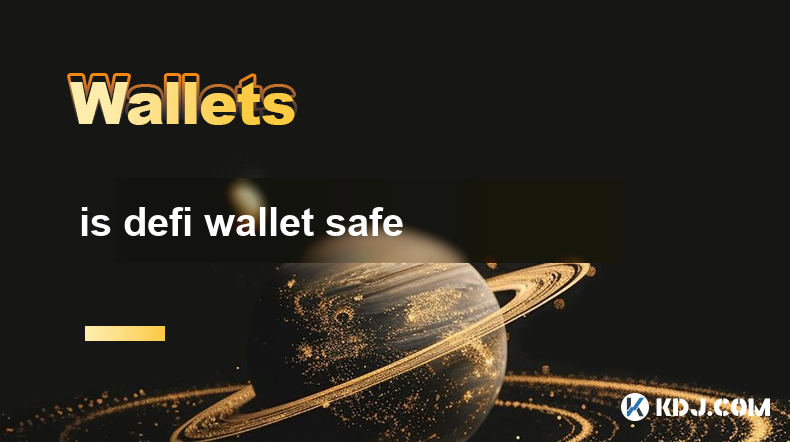
Key Points:
- DeFi wallet security depends heavily on the specific wallet and its implementation. No wallet is entirely risk-free.
- Understanding the risks associated with DeFi wallets, including smart contract vulnerabilities, phishing attacks, and private key compromise, is crucial.
- Best practices like using reputable wallets, enabling two-factor authentication (2FA), and regularly backing up your seed phrase significantly enhance security.
- The level of security offered by different DeFi wallets varies considerably, making careful research essential before choosing a wallet.
- Hardware wallets generally offer superior security compared to software wallets, but come with their own set of considerations.
Is DeFi Wallet Safe? A Comprehensive Look at Security in Decentralized Finance
The question of DeFi wallet safety is paramount for anyone considering participation in the decentralized finance (DeFi) ecosystem. The answer, unfortunately, isn't a simple yes or no. The security of a DeFi wallet hinges on a multitude of factors, ranging from the wallet's design and implementation to the user's own security practices. While DeFi offers exciting opportunities, it's crucial to understand the inherent risks involved.
One significant concern revolves around smart contract vulnerabilities. DeFi applications rely heavily on smart contracts – self-executing contracts with the terms of the agreement between buyer and seller being directly written into lines of code. Bugs or exploits in these contracts can be exploited by malicious actors to drain funds from users' wallets. Thorough audits of smart contracts are essential, but even audited contracts can contain unforeseen weaknesses.
Phishing attacks represent another significant threat. Malicious actors often create fake websites or applications mimicking legitimate DeFi platforms to steal user credentials and private keys. These attacks can be incredibly sophisticated, making it difficult for even experienced users to distinguish them from genuine platforms. Always verify the authenticity of websites and applications before interacting with them.
The security of your private keys is absolutely fundamental. Your private key is essentially the password to your DeFi wallet. If compromised, anyone with access to your private key can completely control your funds. Never share your private key with anyone, and be wary of phishing attempts designed to trick you into revealing it. Regularly backing up your seed phrase – the master key to your wallet – is crucial, but remember to store it securely offline.
Choosing a reputable DeFi wallet is also vital. Not all wallets are created equal. Some wallets are better designed and more secure than others. Research thoroughly before selecting a wallet, paying close attention to its security features, reputation, and user reviews. Look for wallets that have a strong track record and a transparent development process.
Hardware wallets offer a significant increase in security compared to software wallets. Hardware wallets store your private keys on a dedicated physical device, making them significantly harder to hack. While they offer enhanced protection, they're not completely invulnerable and still require careful handling and maintenance.
Software wallets, while generally more convenient, are more susceptible to malware and hacking attempts. They are often connected to your computer or mobile device, making them vulnerable to various forms of attacks. Regular software updates are vital to patch any security vulnerabilities.
Common Questions and Answers:
Q: Are all DeFi wallets equally secure?
A: No, the security of DeFi wallets varies greatly depending on the platform, its security features, and the user's security practices. Some wallets employ stronger security measures than others.
Q: How can I protect my DeFi wallet from phishing attacks?
A: Always double-check the URL of websites and applications before interacting with them. Be wary of unsolicited emails or messages requesting your private keys or seed phrase. Only use official websites and applications.
Q: What is a seed phrase, and why is it important?
A: Your seed phrase is a list of words that acts as the master key to your DeFi wallet. It allows you to recover your wallet if you lose access to your device or if your wallet is compromised. Keep it safe and secure, never sharing it with anyone.
Q: What is the difference between a hardware and software DeFi wallet?
A: Hardware wallets store your private keys on a dedicated physical device, making them more secure than software wallets, which store your keys on your computer or mobile device. Hardware wallets are generally considered more secure but can be more expensive.
Q: What are smart contract vulnerabilities, and how do they affect DeFi wallet security?
A: Smart contracts are the backbone of many DeFi applications. Vulnerabilities in these contracts can be exploited by malicious actors to steal funds. Thorough audits are essential, but no contract is completely immune to vulnerabilities.
Q: What steps can I take to improve the security of my DeFi wallet?
A: Use strong, unique passwords, enable two-factor authentication (2FA) wherever possible, regularly back up your seed phrase, use a reputable wallet provider, be vigilant about phishing attempts, and stay informed about the latest security threats.
Q: Is it possible to recover my funds if my DeFi wallet is compromised?
A: If you have a backup of your seed phrase, you might be able to recover your wallet and funds. However, if your seed phrase is also compromised, recovery is unlikely. That’s why keeping your seed phrase safe and secure is crucial.
Q: Are there any insurance options for DeFi wallets?
A: While some projects are exploring insurance options for DeFi users, this area is still relatively undeveloped. The best protection is proactive security measures to prevent losses in the first place.
Q: Should I use a DeFi wallet if I am new to cryptocurrency?
A: While DeFi offers exciting opportunities, it’s crucial to understand the risks involved before using a DeFi wallet. Start with a smaller amount of funds to gain experience and gradually increase your exposure as you become more comfortable. Thorough research and education are essential.
Disclaimer:info@kdj.com
The information provided is not trading advice. kdj.com does not assume any responsibility for any investments made based on the information provided in this article. Cryptocurrencies are highly volatile and it is highly recommended that you invest with caution after thorough research!
If you believe that the content used on this website infringes your copyright, please contact us immediately (info@kdj.com) and we will delete it promptly.
- Drake, Bitcoin, and Mainstream Music: A New Era?
- 2025-07-07 12:30:12
- Meme Coins, ROI Potential, 2025 Selection: What's Hot and What's Not?
- 2025-07-07 12:30:12
- Bitcoin, Ethereum, and Dogecoin: Navigating the Crypto Landscape in a Wild Week
- 2025-07-07 12:50:11
- Meme Coin Mania: Explosive Picks and Top Buys in 2025
- 2025-07-07 12:50:11
- Bitcoin, Ethereum, and the Cryptocurrency Market: Riding the Wave of Innovation
- 2025-07-07 12:55:12
- Elon Musk, Bitcoin, and Crypto News: A 2025 Perspective
- 2025-07-07 13:10:12
Related knowledge

How to cancel a pending transaction in Phantom wallet?
Jul 03,2025 at 07:21pm
Understanding Pending Transactions in Phantom WalletA pending transaction in the Phantom wallet occurs when a user initiates a transfer or interaction with the Solana blockchain, but it hasn't yet been confirmed by the network. This can happen due to various reasons such as low transaction fees, network congestion, or incorrect gas settings. It's import...

How to see the estimated value of my tokens in Phantom wallet?
Jul 04,2025 at 12:21am
What is Phantom Wallet?Phantom wallet is one of the most popular cryptocurrency wallets designed for the Solana blockchain. It allows users to store, send, receive, and manage various tokens built on Solana, including SPL tokens and NFTs. The wallet offers a user-friendly interface, making it accessible for both beginners and advanced users in the crypt...

How to lock my Phantom wallet extension?
Jul 03,2025 at 11:14am
What Is the Phantom Wallet and Why Lock It?The Phantom wallet is a popular non-custodial cryptocurrency wallet designed for interacting with the Solana blockchain. Supporting both browser extensions and mobile apps, Phantom allows users to store, send, receive, and stake SOL tokens, as well as interact with decentralized applications (dApps). Securing y...

Does Phantom wallet offer two-factor authentication (2FA)?
Jul 03,2025 at 09:00am
Understanding Phantom Wallet and Its Security FeaturesPhantom wallet is a widely used non-custodial cryptocurrency wallet that supports the Solana blockchain. It allows users to store, send, receive, and interact with decentralized applications (dApps) seamlessly. As security is a top priority for any crypto wallet user, security features like two-facto...
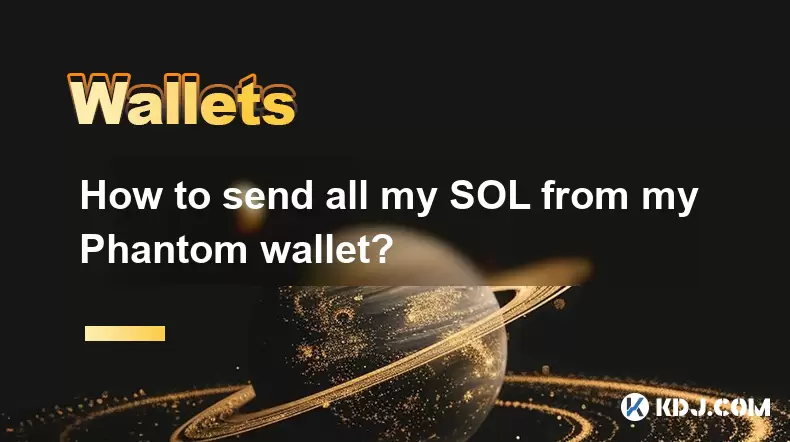
How to send all my SOL from my Phantom wallet?
Jul 06,2025 at 10:00am
Preparing to Send SOL from Your Phantom WalletBefore initiating any transaction, it is crucial to ensure that your Phantom wallet is fully set up and connected to the correct network. Phantom supports multiple networks, but for sending SOL, you must be on the Solana blockchain. Confirm this by checking the network indicator in the top-right corner of th...

What is "rent" on Solana and how does it affect my Phantom wallet?
Jul 02,2025 at 08:35pm
Understanding 'Rent' on SolanaIn the context of Solana, the term 'rent' refers to a storage fee that users pay for maintaining data on the blockchain. Unlike Ethereum, where storage costs are paid once via gas fees during contract deployment, Solana implements a recurring cost model to ensure efficient usage of network resources. This means that any acc...

How to cancel a pending transaction in Phantom wallet?
Jul 03,2025 at 07:21pm
Understanding Pending Transactions in Phantom WalletA pending transaction in the Phantom wallet occurs when a user initiates a transfer or interaction with the Solana blockchain, but it hasn't yet been confirmed by the network. This can happen due to various reasons such as low transaction fees, network congestion, or incorrect gas settings. It's import...

How to see the estimated value of my tokens in Phantom wallet?
Jul 04,2025 at 12:21am
What is Phantom Wallet?Phantom wallet is one of the most popular cryptocurrency wallets designed for the Solana blockchain. It allows users to store, send, receive, and manage various tokens built on Solana, including SPL tokens and NFTs. The wallet offers a user-friendly interface, making it accessible for both beginners and advanced users in the crypt...

How to lock my Phantom wallet extension?
Jul 03,2025 at 11:14am
What Is the Phantom Wallet and Why Lock It?The Phantom wallet is a popular non-custodial cryptocurrency wallet designed for interacting with the Solana blockchain. Supporting both browser extensions and mobile apps, Phantom allows users to store, send, receive, and stake SOL tokens, as well as interact with decentralized applications (dApps). Securing y...

Does Phantom wallet offer two-factor authentication (2FA)?
Jul 03,2025 at 09:00am
Understanding Phantom Wallet and Its Security FeaturesPhantom wallet is a widely used non-custodial cryptocurrency wallet that supports the Solana blockchain. It allows users to store, send, receive, and interact with decentralized applications (dApps) seamlessly. As security is a top priority for any crypto wallet user, security features like two-facto...

How to send all my SOL from my Phantom wallet?
Jul 06,2025 at 10:00am
Preparing to Send SOL from Your Phantom WalletBefore initiating any transaction, it is crucial to ensure that your Phantom wallet is fully set up and connected to the correct network. Phantom supports multiple networks, but for sending SOL, you must be on the Solana blockchain. Confirm this by checking the network indicator in the top-right corner of th...

What is "rent" on Solana and how does it affect my Phantom wallet?
Jul 02,2025 at 08:35pm
Understanding 'Rent' on SolanaIn the context of Solana, the term 'rent' refers to a storage fee that users pay for maintaining data on the blockchain. Unlike Ethereum, where storage costs are paid once via gas fees during contract deployment, Solana implements a recurring cost model to ensure efficient usage of network resources. This means that any acc...
See all articles























